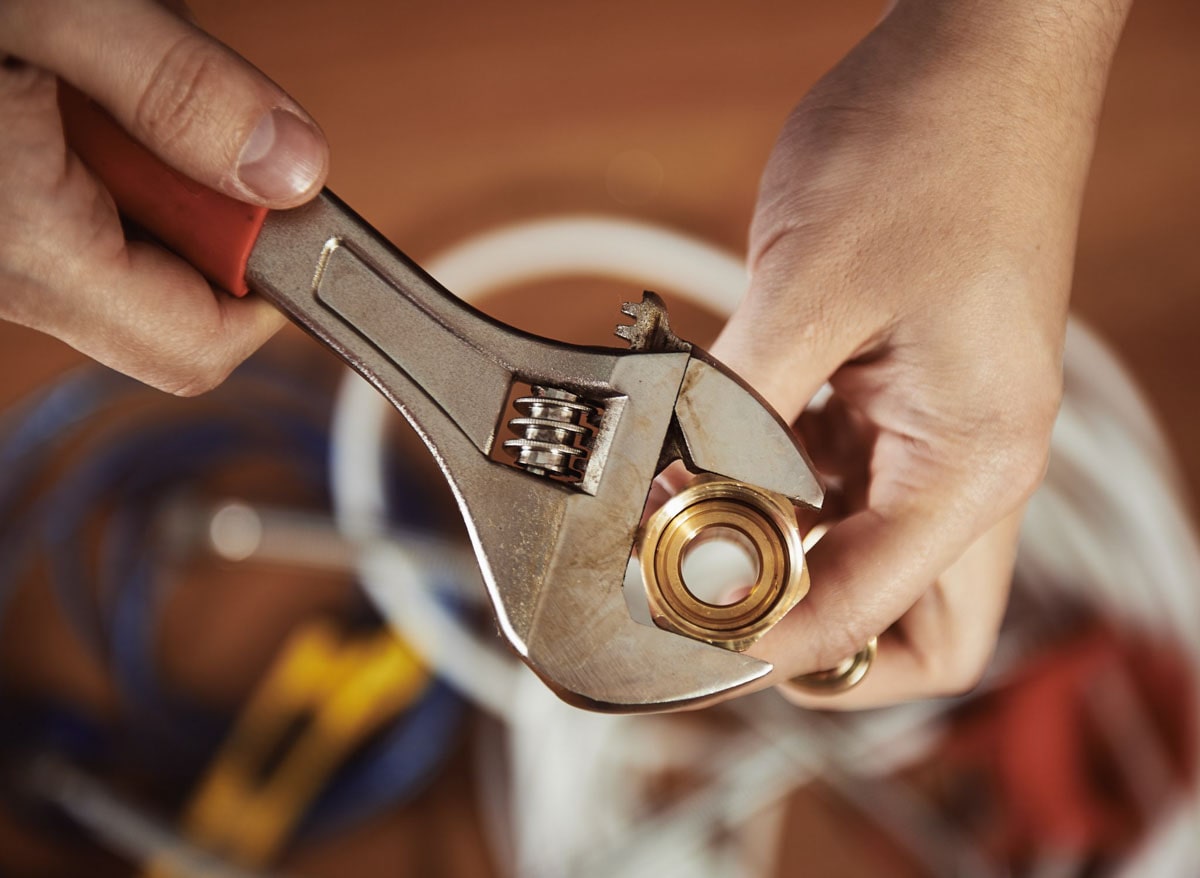When starting a plumbing business, it’s easy to feel out of your element, overwhelmed by the wide variety of necessary tools. Use this best plumbing tools guide to discover the top 43 tools needed to get started.
In this best plumbing tools guide, you’ll discover:
- The best plumbing tools needed to get started
- Professionally recommended, trusted tools and brands
By taking advantage of this complete guide, you’ll be able to save money and buy only the most necessary, best plumbing tools that business owners know and love.
The Essentials: Best Plumbing Tools
When buying the best plumbing tools for the business, remember it’s unnecessary to buy everything at once.
Generally, it’s best to start with a few main services you’re great at and become known for them. Then, gradually add more services as you can afford additional tools.
While you’ll need to pick and choose tools based on on the plumbing services you choose to offer, here is an extensive list of the best plumbing tools needed for your business:
Tools for Clearing Clogs
1. Borescope
You’ll need to see what and where the problem is using a borescope (i.e. pipe and drain inspection camera). Plumbers should use a borescope before and after clog removal to ensure the line is completely clear.
2. Drain Auger
One of the fastest, most efficient ways to clear external clogs outside the home (e.g. sewer drain clogs) is by using a drain auger. Rather than using a manual drain auger, drum machines are the fastest, most efficient choice.
3. Drain Snakes
Opposite to drain augers, drain snakes are used to clear internal clogs inside the home (e.g. sinks, bath tubs, etc.) When a plunger can’t get the job done, drain snakes are great at clearing clogs.
Keep in mind, while cable machines (a type of drain snake) are great for hair, hard blockages, and retrieval clogs, you’ll need to use an air gun for slow drains and grease clogs. You might even need a toilet and urinal auger.
4. Hydro-Jet Machine
A hydro-jet machine sprays water at a high pressure to clear soft stoppages (e.g. grease, hardened sewage, hair build-up, sand, etc.). Whereas, hard stoppages (e.g. roots) need to be physically removed with a cable machine (like the ones mentioned above).
While you can eventually purchase trailer and truck-mounted water-jetting machines later on, these portable hydro-jet machines will likely be a better option if you’re a newer business.
5. Plungers
While a plunger is an obvious essential tool for plumbers, take a look at some top-of-the-line options:
Pipe Working Tools
6. Acid Flux Brush
An acid flux brush (a small, disposable, multi-purpose brush) is typically used in the plumbing industry to apply acid flux for pipe smoldering.
7. Assorted Pliers
Plumbers use pliers every day. A wide assortment of pliers are needed to loosen and tighten nuts and bolts which are smaller than a wrench can grip. Plus, they’re great for tight spaces when you can’t squeeze in a wrench.
Since a wide variety of pliers are needed (i.e. locking pliers, needlenose, etc.), it’s important to have an assorted set of pliers to tackle any job. In order to save money and space in your toolbox, consider purchasing combination tools where possible.
Grab what you need and choose from these top professional pliers options.
Mole Grip Pliers
In addition to a collection of assorted pliers, you’ll also need mole grip pliers. Mole grips (i.e. locking pliers) keep metal parts in position during welding. For example, a plumber seals copper piping by using a plumber’s torch to solder it.
These are a few mole grips to choose from:
Tongue and Groove Pliers
Lastly, you’ll need tongue and groove pliers (i.e. Channellocks, multi-grips, water-pump pliers) for the majority of plumbing jobs. These are commonly used to turn and hold nuts and bolts, grip or rotate irregular objects, and clamp materials.
Take a peek at some of the best tongue and groove pliers for professional plumbers:
- Channellock Tongue and Groove Pliers
- Crescent Tongue and Groove Pliers
- Milwaukee Tongue and Groove Pliers (10-inch and/or 12-inch)
8. PEX Crimping Tool Kit With Tube Cutters
Crimped (i.e. pressed) plumbing connections are created using a powered crimping tool to attach copper tubing with the special copper fittings.
While these are PEX crimping tool kits, they’re technically a two-in-one because they also include tube cutters (another tool needed):
9. Deburring and Reaming Tools
Plumbers use deburring tools to remove burrs from modifications to pipe edges. Reaming tools are used to enlarge pipe holes or openings.
10. Emery Cloth
An emery cloth is an abrasive material mostly used to smooth the edges of copper piping. All plumbers need a roll of emery cloth on hand.
11. Hacksaw
Typically, plumbers use hacksaws to cut pipes and other metal.
12. Hole Saw Kit
A hole saw kit is commonly used to drill large-diameter holes.
Choose from any of these top hole saw kits to best suit your needs:
13. Metal File and Brush
Plumbers use metal files to smooth rough edges. Then, brushes are used to remove remaining residue. Next, with PVC pipe glue, plumbers can get a watertight seal
Here are some basic metal file sets (even if you don’t choose one of these sets, be sure to choose a set with a flat file, a half-round file, and a brush):
14. Pipe and Tubing Cutters
Depending on the pipe, a pipe cutter can be used instead of a hacksaw to get a faster, cleaner, more uniformed cut on a pipe.
Take a look at a few options for pipe and tubing cutters:
15. Plumber’s Torch
Propane torches are typically included in beginner’s kits, but professional businesses often purchase higher quality plumber’s torches with regulators and tips best suited for specific jobs.
A plumber’s torch is used to add piping for a new fixture, repair leaking valves, and replace old pipes.
Here’s a quick look into a few top-notch plumber’s torches:
- Bernzomatic High Intensity Trigger Start Torch
- LEXIVON Butane Torch Multi-Function Kit
- Worthington Trigger Start Propane Torch
16. Press Fitting Systems
Even though it’s been around for more than 40 years, press fitting is still considered a new plumbing technique. Due to the safety regulations and permits in place for soldering (e.g. plumber’s torches help with soldering), plumbers are increasingly choosing press fitting systems instead. Plus, press fitting decreases the chance of fire and injury because of the open flame.
In addition, compared to soldering, press fitting systems save time in cutting, prepping, and connecting pipes. Also, there’s less downtime because, unlike soldering, you don’t have to wait for a pipe to dry.
Take a look at a few of the best options for press fitting systems:
17. Ratcheting Pipe Threader Set
A ratcheting pipe threader is used to cut threads into the end of a pipe, which gives pipe joints a watertight seal.
These are a few great ratcheting pipe threader set options:
18. Swaging and Flaring Tools
Swaging and flaring are similar processes that gradually widen the end of a tube to create new connections. By the way, if you don’t already have one, don’t forget to have a deburring tool for this process!
Here are a few flaring tools to consider:
Also, here are a few swaging tools to consider:
Plus, here’s a flaring and swaging kit:
19. Thread Sealing Tape, Plumber’s Putty, and Putty Knife
Thread sealing tape (i.e. PTFE tape, Teflon tape, or plumber’s tape), a polytetrafluoroethylene film tape, is used to seal pipe threads and can be cut to specific sizes and wound on a spool.
These are a few thread sealing tape choices:
- Harvey Thread Sealing PTFE Plumber’s Tape
- Hercules Thread Sealing PTFE Plumber’s Tape
- Oatey Fastape Thread Sealing PTFE Plumber’s Tape
Also, much like plumber’s tape, plumber’s putty is used to seal and prevent leaks around things like toilets, sinks, drains, and tubs.
Here’s a look at some of the top plumber’s putty options:
- Hercules Gasket and Pipe Thread Sealant
- RectorSeal Teflon Pipe Thread Sealant
- RectorSeal Tru-Blu Pipe Thread Sealant With PTFE
In addition to plumber’s putty, you’ll also need a putty knife to install the putty.
Take a peek at a few great putty knives:
20. Tube and Pipe Benders
A tube and pipe bender is used to create accurate and consistent bends in copper, steel, and aluminum tubes and pipes.
Take a glance at a few great tube and pipe benders:
21. Assorted Wrenches
Much like pliers, plumbers commonly use wrenches every day for pipe working. Most notably, the adjustable pipe wrench is one of the main wrenches used by plumbers to tighten and loosen nuts and fittings in pipes.
Here’s a condensed list of common wrenches needed:
- Adjustable Pipe Wrench
- Adjustable Wrench
- Basin Wrench
- Milwaukee Basin Wrenches (1.25-inch and/or 2.5-inch)
- RIGID Basin Wrench
- Faucet Key (i.e. sillcock key)
- Faucet Seat Wrench
- Garbage Disposal Wrench
- Internal Pipe Wrench
- Shower Valve Socket Wrench
- Strainer Locknut Wrench
- Torque Wrench
Miscellaneous Tools: The Best Plumbing Tools to Add to Your Collection
22. Bucket
Whether you’re unclogging a garbage disposal or sink, buckets are a useful, affordable tool to have on hand.
Since the bucket is mostly used to hold waste, there’s no need for an expensive bucket. A large, plastic, 5-gallon bucket is the perfect size to fit everyday needs.
23. Carpenter Pencils and Markers
Depending on the surface you need to mark for cutting, sawing, or measuring, you’ll need carpenter pencils and markers.
For carpenter pencils, Home Depot’s are an affordable option that will work great. As for markers, Pro Sharpies will do just fine.
24. Caulk Gun and Silicone Caulk
Plumbers use caulk guns and silicone caulk to seal gaps and cracks on the job.
Have a look at some top caulk guns:
- DEWALT Cordless Adhesive Dispensers
- Milwaukee Cordless Caulk and Adhesive Guns
- RIGID Caulk and Adhesive Gun
25. Jab Saws
Primarily used for cutting through drywall, plumbers need jab saws to get to pipes and tubing behind walls.
These are a few great options for professional jab saws:
26. PEX Pipe Expander and Fittings
In the plumbing industry, PEX pipe expanders and fittings are primarily used for residential hot and cold water supply lines. Expander fittings are ideal for hard-to-reach areas because they reach more easily than other systems.
Take a look at some PEX pipe expander and fittings tool kits:
27. Pressure Gauges
Pressure gauges (i.e. compressed air test gauges) are commonly used by plumbers to check for leaks in water piping without having water in the pipes.
Take a look at a few pressure and test gauge options:
- DANCO Increment Compressed Air Test Gauge
- HOME-FLEX Pressure Test Gauge
- Winters Instruments Water Pressure Test Gauge
28. Spray Lubricants
In order to fix certain plumbing problems, you’ll sometimes have to use a spray lubricant to take the object apart and get to the root of the problem. For example, if there’s a clogged showerhead that’s not easily fixable, you’ll likely use spray lubricant to safely and easily remove the showerhead to find and fix the problem.
Here are the best choices for spray lubricants:
29. Stubby Screwdriver
As you’re often working in tight spaces, stubby screwdrivers will help to navigate to those hard-to-reach places.
This is one of the top stubby screwdrivers:
30. Tape Measure
As one of the most commonly used plumbing tools, a quality tape measure should always be included in any tool bag.
Check out one of these professionally-recommended, top-of-the-line tape measures:
- Stanley Tape Measure
- Lufkin Tape Measure
- Milwaukee Tape Measure
- DEWALT Tape Measure
- Tajima Tape Measure
31. Tool Belt and Tool Pouch
Since plumbers need to carry various tools to job sites as well as fit into tight spaces, it’s important to have a portable tool belt and tool pouch.
Take a look at some of the top tool belts for professionals:
- Husky Tool Belts (one with suspenders and/or one without)
- McGuire-Nicholas Leather Contractor’s Apron
- Milwaukee General Contractor Work Belt With Suspension Rig
Also, these are a few tool pouches to consider:
32. Tool Box
Due to the fact that you likely won’t be able to fit all of the necessary job tools into a tool belt or pouch, you’ll need a tool box to lug around unexpected plumber tools.
Here are a few tool boxes to think about:
- DEWALT Toolboxes
- Milwaukee Tool Boxes (modular, rolling, 3-drawer)
- RIGID Tool Boxes (cart, tool box, and tool storage)
33. Washers and O-Rings
Plumbers use o-rings (i.e. rubber rings) to put around pipes and work with washers to seal up gaps so that water can’t escape.
Here is a top option for washers:
Also, this is a top choice for o-rings:
Plumbing Safety and PPE
Plumbing safety and PPE (personal protection equipment), is important to protect you, your employees, and your business. Plus, there are legal requirements involving plumbing safety and PPE.
When in doubt, always check with the local government to ensure you’re adhering to regulations and are following proper procedures.
In addition to acquiring the proper certifications and following government guidelines, it’s also important to know OSHA guidelines. Plus, it’s also a good idea to get a headstart in taking OSHA safety training courses.
In order to prevent injuries, it’s important to buy the best quality equipment you can afford.
Additionally, you’ll need to conduct routine equipment inspections to ensure the equipment works, it’s being kept in top shape, it’s routinely disinfected, and it’s being thrown away after exposure to chemicals and toxins.
34. Back and Knee Protection
Since you’ll be working in tight spaces, in awkward angles, and with heavy equipment and piping, it’s essential to have heavy-duty knee pads or a skid-proof kneeler to support, cushion, and protect the knees.
In addition, back support is important as well for preventing injuries when climbing ladders or handling heavy equipment and materials.
35. Detection Equipment
It’s important to have reliable detection equipment for carbon monoxide, smoke, and gas.
36. Face Masks
Wear a disposable face mask for sawing and sanding.
Consider heavy-duty respiratory equipment when many germs or chemicals are involved.
37. Flashlights and Headlamps
Whether you’re working in an attic, crawl space, or under the kitchen sink, it’s essential to have proper lighting.
38. Gloves
Protect hands against chemicals and other potential hazards. Use heat-insulating, leather gloves and wear latex gloves underneath the leather gloves for protections against biohazards in drain lines.
39. Goggles or Safety Glasses
Depending on the job, it’s important to protect your eyes against chemicals, germs, and debris, which can potentially harm your eyes.
40. Hard Hats
Whether you’re walking through an attic or maneuvering through a crawl space, it’s important to protect your head from falling debris and solid objects.
41. Heat Shields and Pads
When soldering, it’s essential to have heat shields and pads to protect yourself and the surrounding area from heat damage and fire.
42. Non-Skid Work Boots With Protective Toes
Considering the wet environments plumbers work in, it’s important to have non-skid work boots that protect against slipping and falling.
Plus, considering the hazardous spaces plumbers work in combined with the heavy equipment and materials involved, it’s important to have work boots that also have protective toes.
43. Uniforms
For the ultimate protection of the team as well as maintaining a professional appearance, uniforms are an essential part of plumbing PPE and safety.
In addition to proper PPE, it’s also important to keep a fully stocked first aid kit on hand for injuries. Also, it’s a good idea to train your plumbers in first aid and CPR.
The #1 Plumbing Tool to Add to Your Business
Out of everything previously mentioned, FieldEdge is the #1 plumbing tool to add to your business. Using this software, you’ll have the power to reach goals sooner so your plumbing business can grow faster than ever.
Here’s how the best plumbing software can transform your business:
- Easy quoting in the field
- Track every job, every step of the way
- Take FieldEdge anywhere using the Mobile App
- Create long-term customers by leveling up customer service
- Take advantage of instant scheduling, dispatching service, lead management/CRM, invoicing, and billing
By choosing FieldEdge, the sky’s the limit of what you can accomplish.
Experience firsthand how the #1 plumbing software will revolutionize your business. Book a demo for FREE of FieldEdge today!
Take Your Business to the Next Level Using the Best Plumbing Tools
Using the professionally recommended products in this guide, there’s no more guesswork on which tools or brands to buy.
In this best plumbing tools guide, you can:
- Buy the essentials needed
- Choose the right brands for your business
- Explore how the best plumbing software transforms your business
Finally, you know everything there is to take your business to the next level using the best plumbing tools!




